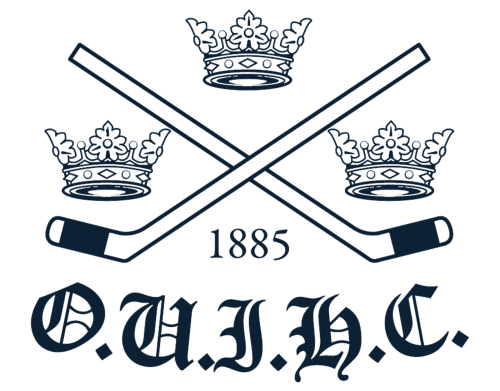For roughly two decades of my life, hockey – or ice hockey so as not to confuse my British friends – occupied the majority of my time. If I wasn’t playing it or training for it, I was thinking about it. While playing junior hockey in Strathroy, Ontario, our coach and mentor, Pat Stapleton, a former Chicago Blackhawks and 1972 Summit Series defenseman, outlined three key interdependent elements critical to success in the game:
I have yet to experience anything that brings these elements together like hockey does. As a goaltender, each one had heightened importance. A lapse in discipline at any point in the game could be the difference between a save and a goal. Admittedly, I still think about hockey every day. Whether I’m just walking around, working, or even during stressful days of infantry field training, I’ll be automatically, imaginatively, and momentarily back on the ice in a game looking out through the cage of my helmet.
Being very much aware of the deficiencies in the interdependent elements of my game that limited my performance and consequently my career, I carry regret. However, my imaginative return to the ice in some of the past jerseys I’ve worn also results from the fact that I channel lessons learned from hockey to drive me forward. I learned to correct my approach too late to salvage a hockey career, but I learned in time to reinforce these lessons in other arenas of life, where I’ve found they have universal applicability.
I don’t have to think long to attribute unique opportunities for growth and development I’ve had to hockey. For example:
- Learning the ropes of the scouting process at a young age taught me professional conduct. Young hockey players learn how to give a good handshake long before their peers, despite the frequent limp handshakes during post-game line-ups.

The Wet Fish Handshake. Courtesy of jokers during post game handshake lineups.
- Leaving home at a young age to play junior hockey was an experience all to itself. Young players live with a new family and go to a new school. Through junior hockey, I navigated three different high schools and teams.
- The jump from Canadian junior to US NCAA hockey allowed me to represent my school through hockey while earning an undergraduate degree (mostly in that order of priority) in Boston.
There comes a day however, when you realize –finally – that it’s all over. For me, that happened almost 10 years ago, and I’m now in the hockey afterlife. In my hockey afterlife practices are evil, and games come with a stipulation that there’s beer afterward. Additionally, I can only play when the boss let’s me. The boss is my groin.
Amazingly, the unique opportunities that hockey (and sports in general) provides continue. My MBA classmates Caryn Davies (US gold medal rowing Olympian) and Sam Peter (South Africa Rugby Varsity Cup veteran) will agree with me that competing for Oxford University enables new networks and social circles along with balance.
Rowing, rugby, and cricket are the three major sports at Oxford University, and their athletes compete for prestigious Oxford Full Blues. It’s the highest honour a student athlete can achieve. The honour of earning Blues has been in effect since the 1860s, and in addition to being recognized as a successful athlete at the national level, the student is entitled to wear the distinguished Dark Blues Blazer and gain admittance into Vincent’s Club. The club was founded in 1863 and includes members such as Sir Roger Bannister and the Rt Hon Cecil Rhodes. Our Director of Careers here at Saïd Business School, Derek Walker, will be the first to tell you that earning a Blue is something to quickly add to your CV.

Vincent’s Club, Oxford. Photo courtesy of vincents.org.
Spectacularly, ice hockey here at Oxford University has Blues status. The Oxford University Ice Hockey Club (OUIHC) is born from a history that dates back to 1885 with the first Varsity Match versus Cambridge. Oxford is recognised as the second oldest team in the history of the sport. The Oxford Canadians were later formed in 1905, becoming the first Team Canada. If that’s not enough, the team’s esteemed alumni list includes the likes of the Rt Hon Lester B. Pearson (former Canadian Prime Minister and Nobel Peace Prize winner), Clarence Campbell (former NHL President), and Mark Carney (current Governor of the Bank of England).
130 years on, OUIHC – through partnership with the Women’s team and our friends from Oxford Brookes University – has a fun, integrated, and inclusive community that is in keeping with Oxford University’s continually evolving combination of tradition, prestige, heritage, and integration, while also maintaining standards for Blues status and Varsity Match rules.

The 2014 OUIHC Men’s and Women’s Christmas Party.
Recently, the OUIHC Women’s and Men’s teams were invited to the Rhodes House to meet one of our distinguished ice hockey alumni, John McCall MacBain, who made headlines in 2013 with his Foundation’s landmark £75 million donation to the Rhodes Trust. John is passionate about ice hockey at Oxford University, having been Co-Captain of the team, and continues to provide massively generous support. Our teams had the opportunity to meet and chat with John and tour the Rhodes House, which itself has a brilliant history.

Rhodes House, Oxford. Photo courtesy of cecilrhodes.co.za.
I certainly encourage students who are planning to attend Oxford University to further engage with this 800+ year old institution as Caryn, Sam, and I have done by joining its sports teams, contributing to their pursuits of victory over Cambridge, and potentially earning a coveted Blue in the process. Truly, the hockey afterlife is good

